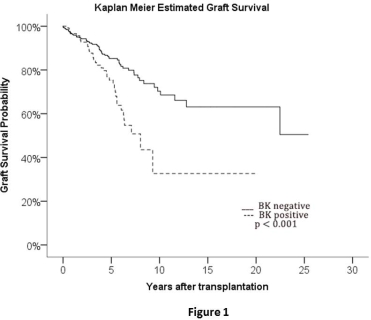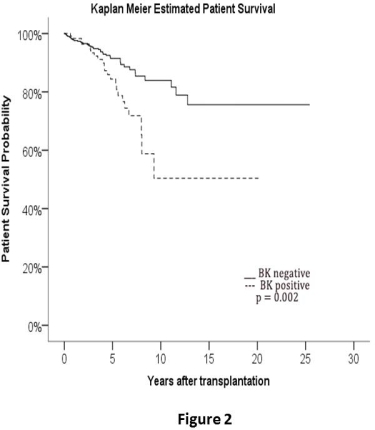Prevalence, Risk Factors and Impact of BK Viremia on Kidney Transplantation: Single Center Experience
Nephrology, University of Kentucky, Lexington, KY.
Meeting: 2018 American Transplant Congress
Abstract number: C192
Keywords: Graft survival, Kidney transplantation, Outcome, Polyma virus
Session Information
Session Name: Poster Session C: Kidney: Polyoma
Session Type: Poster Session
Date: Monday, June 4, 2018
Session Time: 6:00pm-7:00pm
 Presentation Time: 6:00pm-7:00pm
Presentation Time: 6:00pm-7:00pm
Location: Hall 4EF
Introduction: BK viremia (BKV) is an emerging problem in renal transplantation. The risk factors and the impact of BKV on renal allograft and patient survival are debatable. Herein we are reporting an eight-years single center experience on prevalence, risk factors and outcomes of BKV in kidney transplant recipients.
Methods: This is a retrospective analysis of all patients who received a kidney transplant in University of Kentucky and had BK viral titer available from 2009 to 2017. BKV was tested using real-time PCR. Among 649 patients, 122 (18.8%) developed BKV with at least a PCR viral load of 10,000 copies/ml. Demographic, clinical and laboratory data generated during routine outpatient follow-up and inpatients records were collected.
Results: The majority of the patients were men (72.1% of the BK positive and 58.4% of the BK negative patients (P = 0.005)) and Whites (82.0%of the BK positive and 82.7%of the BK negative patients (P = 0.684)). Eighty percent of BK positive and 70% of BK negative patients received deceased donor kidneys (P = 0.143). The mean age was 52.2 years for the BK positive patients and 48.2 years for the BK negative patients (P = 0.004). The mean time for developing BKV after transplantation was 306 ± 542 days. The 1-, 5- and 10-years graft survivals were 97%, 75% and 29% for the BK positive patients and 96%, 85% and 71% for the BK negative patients.  The 1-, 5- and 10-years patient survivals were 98%, 84% and 50% for the BK positive patients and 98%, 92% and 84% for the BK negative patients.
The 1-, 5- and 10-years patient survivals were 98%, 84% and 50% for the BK positive patients and 98%, 92% and 84% for the BK negative patients. 
Conclusion: BKV is not uncommon after renal transplantation. Risk factors for BKV are male gender and older patients. BKV adversely affected graft and patient survivals.
CITATION INFORMATION: Hassan W., El-Husseini A., Suleiman B., Wang K., Yaseen M., Maibam A., Karim A., Hines A., Castellanos A., Cornea V., Mei X., Gedaly R., Waid T. Prevalence, Risk Factors and Impact of BK Viremia on Kidney Transplantation: Single Center Experience Am J Transplant. 2017;17 (suppl 3).
To cite this abstract in AMA style:
Hassan W, El-Husseini A, Suleiman B, Wang K, Yaseen M, Maibam A, Karim A, Hines A, Castellanos A, Cornea V, Mei X, Gedaly R, Waid T. Prevalence, Risk Factors and Impact of BK Viremia on Kidney Transplantation: Single Center Experience [abstract]. https://atcmeetingabstracts.com/abstract/prevalence-risk-factors-and-impact-of-bk-viremia-on-kidney-transplantation-single-center-experience/. Accessed February 23, 2026.« Back to 2018 American Transplant Congress
